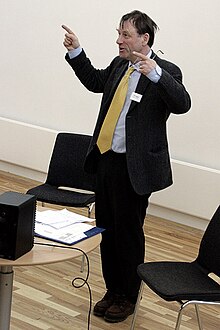Tim Ingold
Tim Ingold FBA FRSE (actually Timothy Ingold ) (born November 1, 1948 ) is a British anthropologist and holder of the chair of social anthropologist at the University of Aberdeen . In his work, he dealt with the herd cultures of the circumpolar peoples, with topics such as hunting , sacrifice , shamanism and, more generally, with the human-animal relationship in hunter, herd-owner and farmer cultures as well as with questions of ecological adaptation and social organization of these cultures . Later he greatly expanded his research interests and analyzed human tool use.
life and work
Ingold, son of the mycologist Terence Ingold and brother of the urban planner and spatial planner Patsy Healey , studied social anthropology in Cambridge out of disappointment with the achievements of modern science, but also to bridge the growing gap between natural and social sciences and initially taught from 1973-74 in Helsinki , where he examined the ecological adaptation of the Sami reindeer herders in northeastern Finland and their relationship to nature, which they do not understand as an inanimate "outside". In 1976 he wrote his PhD thesis on this topic. In 1990 he became a professor in Manchester and in 1999 in Aberdeen. He is a member of the Royal Society of Edinburgh and the British Academy. In 2015 he received an honorary doctorate (Dr. hc) from the Leuphana University of Lüneburg, and in 2019 an honorary doctorate from the University of Lapland .
Ingold examines the interaction between humans and nature on various levels and integrates philosophical, psychological, biological and aspects into his work. He is a critic of the application of the classical theory of evolution and behavioral research in sociobiology . His theories include the assumption of parallelism between one or more of the circumpolar peoples, but presumably also divine masters of the (wild) animals , who were already worshiped by ancient oriental cultures, on the one hand, and the human herd owners on the other. Both are subject to a supreme deity; both have the right to kill, but must make sacrifices to do so. In the light of Ingold's theory, for example, the biblical Noah appears as a ruler appointed by God over the animal kingdom.
Publications
- Hunters, pastoralists and ranchers: reindeer economies and their transformations . 1980.
- (Ed.): Key Debates in Anthropology. London: Routledge 1996 online (pdf)
- Making: Anthropology, Archeology, Art and Architecture. London: Routledge 1996.
- with David Riches and James Woodburn : Hunters and Gatherers. Vol. 1: History, Evolution and Social Change. Vol. 2: Property, Power and Ideology. Bloomsbury Academic 1997.
- Lines: A Brief History . London: Routledge 2016 [2007]. Preview online .
- Being Alive: Essays on Movement, Knowledge and Description. London: Routledge 2011.
- Making: Anthropology, Archeology, Art and Architecture. London: Routledge 2013.
- The Life of Lines . London: Routledge 2015. Preview online .
- Anthropology an / as Education . London: Routledge 2017.
-
Anthropology: Why it matters . Cambridge: Polity Press 2018.
- Translation: Anthropology: What It Means and Why It Matters . Wuppertal: Peter Hammer 2019. (from the English by Werner Petermann)
Web links
Individual evidence
- ^ Peter Marren: Professor C Terence Ingold: Foremost authority on the study of fungi whose work spanned eight decades ( en ) In: The Independent . June 17, 2010. Accessed July 31, 2017.
- ^ Leuphana University of Lüneburg: Timothy Ingold. In: www.leuphana.de. Retrieved April 27, 2016 .
- ^ University of Lapland awards 18 honorary doctorates. In: www.ulapland.fi. Retrieved May 17, 2020 .
- ↑ Bernhard Lang: Yahweh, the biblical God: A portrait. Darmstadt 2002, p. 126
| personal data | |
|---|---|
| SURNAME | Ingold, Tim |
| BRIEF DESCRIPTION | British anthropologist |
| DATE OF BIRTH | November 1, 1948 |
